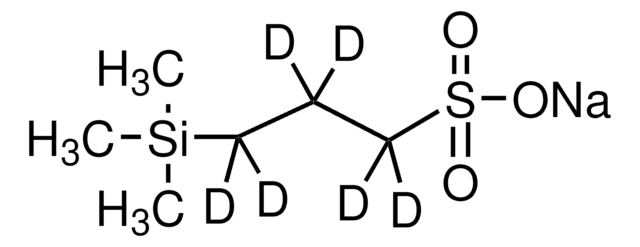Alle Fotos(2)
Wichtige Dokumente
343773
Deuteriumoxid
99.9 atom % D, contains 1 % (w/w) 3-(trimethylsilyl)-1-propanesulfonic acid, sodium salt (DSS)
Synonym(e):
Schweres Wasser, Wasser-d2
Anmeldenzur Ansicht organisationsspezifischer und vertraglich vereinbarter Preise
Alle Fotos(2)
About This Item
Empirische Formel (Hill-System):
D2O
CAS-Nummer:
Molekulargewicht:
20.03
EG-Nummer:
MDL-Nummer:
UNSPSC-Code:
12142201
PubChem Substanz-ID:
NACRES:
NA.21
Empfohlene Produkte
Isotopenreinheit
99.9 atom % D
Qualitätsniveau
Form
liquid
Enthält
1 % (w/w) 3-(trimethylsilyl)-1-propanesulfonic acid, sodium salt (DSS)
Methode(n)
NMR: suitable
bp
101.4 °C (lit.)
mp (Schmelzpunkt)
3.8 °C (lit.)
SMILES String
[2H]O[2H]
InChI
1S/H2O/h1H2/i/hD2
InChIKey
XLYOFNOQVPJJNP-ZSJDYOACSA-N
Suchen Sie nach ähnlichen Produkten? Aufrufen Leitfaden zum Produktvergleich
Anwendung
Deuterium oxide can serve as a solvent in the :
- NMR analysis.
- 1HDOSY (Diffusion-Ordered Spectroscopy) NMR experiments.
Empfohlene Produkte
Check out ChemisTwin®, our brand new online portal for identity confirmation and quantification of NMR spectra. Learn more or reach out to us for a free trial.
Lagerklassenschlüssel
10 - Combustible liquids
WGK
WGK 3
Flammpunkt (°F)
Not applicable
Flammpunkt (°C)
Not applicable
Hier finden Sie alle aktuellen Versionen:
Besitzen Sie dieses Produkt bereits?
In der Dokumentenbibliothek finden Sie die Dokumentation zu den Produkten, die Sie kürzlich erworben haben.
Kunden haben sich ebenfalls angesehen
The ionization constant of deuterium oxide from 5 to 50?.
Covington AK, et al.
The Journal of Physical Chemistry, 70(12), 3820-3824 (1966)
Structure of water and hydrophobic bonding in proteins. IV. The thermodynamic properties of liquid deuterium oxide.
Nemethy G and Scheraga HA.
J. Chem. Phys. , 41(3), 680-689 (1964)
Using high-performance quantitative NMR (HP-qNMR?) for certifying traceable and highly accurate purity values of organic reference materials with uncertainties< 0.1%.
Weber M, et al.
Accreditation and Quality Assurance, 18(2), 91-98 (2013)
Liset Westera et al.
Blood, 122(13), 2205-2212 (2013-08-16)
Quantitative knowledge of the turnover of different leukocyte populations is a key to our understanding of immune function in health and disease. Much progress has been made thanks to the introduction of stable isotope labeling, the state-of-the-art technique for in
Frank Grüne et al.
Anesthesiology, 120(2), 335-342 (2013-09-07)
Hyperventilation is known to decrease cerebral blood flow (CBF) and to impair cerebral metabolism, but the threshold in patients undergoing intravenous anesthesia is unknown. The authors hypothesized that reduced CBF associated with moderate hyperventilation might impair cerebral aerobic metabolism in
Unser Team von Wissenschaftlern verfügt über Erfahrung in allen Forschungsbereichen einschließlich Life Science, Materialwissenschaften, chemischer Synthese, Chromatographie, Analytik und vielen mehr..
Setzen Sie sich mit dem technischen Dienst in Verbindung.






